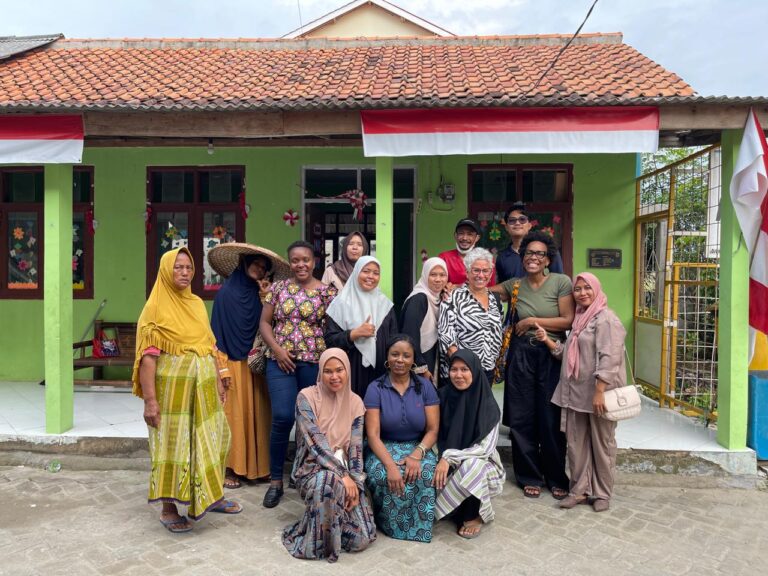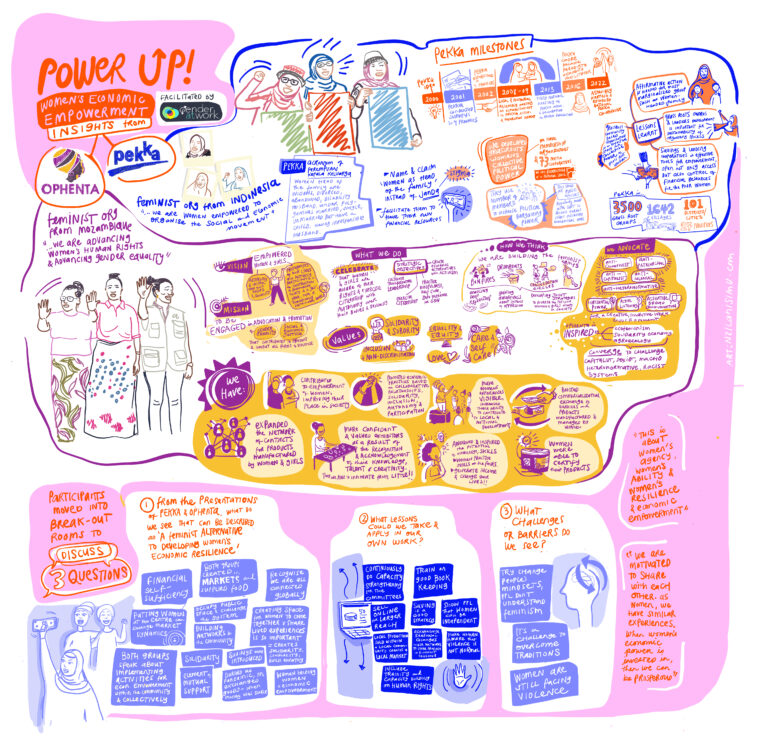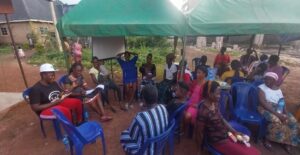Between 17 and 23 November 2024, Gender at Work co-organised an inspiring learning exchange as part of the Power Up! programme—a five-year initiative aimed at supporting womxn-led collectives, movements, and organisations in challenging oppressive power structures. Seeking to build bridges across borders and increase transnational knowledge on feminist methodologies and strategies for women’s financial autonomy and economic resilience, PEKKA Foundation (Indonesia), OPHENTA (Mozambique) and Gender at Work came together in Indonesia for an immersive and enriching week.

Building global solidarity
As a member of the Power Up! Consortium, Gender at Work supports partner organisations working towards transformative change in more than 10 countries, including Mozambique, with a commitment to strengthening feminist knowledge production and centring the voices of women most affected by economic challenges. The learning exchange in Indonesia exemplifies this mission by fostering feminist solidarity spaces for co-creation, collective strategising, and collaborative knowledge building.
This exchange arose from the shared vision of PEKKA—also a Power Up! Consortium member—and OPHENTA, a participant in action research led by Kaleidoscopio, Gender at Work’s Mozambique-based partner: both organisations champion women’s economic and social empowerment in their respective countries. The exchange marked the culmination of a two-year process, building on two virtual meetings in 2023. Bringing communities from Indonesia and Mozambique together in person proved instrumental for deepening mutual understanding and learning.

For OPHENTA, a feminist organisation rooted in Mozambique’s solidarity economy, this exchange was an opportunity to learn from PEKKA’s decades of grassroots experience in mobilising women-headed families and building resilient economic communities through cooperative economy models. It was also an opportunity to learn and adapt their own feminist methodologies for addressing gender-based violence and promoting economic alternatives. OPHENTA also shared its community engagement approach to tackling violence against women and advancing feminist economic alternatives, grounded in feminist values and collective action.
The 5-day exchange featured activities designed to deepen collaboration and mutual learning:
- Participatory seminars: The three organisations shared experiences, debated ideas, and fostered synergies. On Days 2 and 3, participants explored PEKKA’s innovative working models, including its cooperatives, associations, markets, and the Paradigta Academy (an informal learning initiative encouraging women to engage in conversations and actions aligned with the ‘Me, We, Us’ framework).
- Grassroots visits: Participants had the opportunity to engage with women market traders and PEKKA activists to understand their models of economic and political organising, income generation, and cooperative systems.
- Feminist talks: Informal campfire discussions provided opportunities for OPHENTA to share its feminist consciousness-raising strategies, focusing on addressing gender-based violence and promoting sexual and reproductive health rights. On Day 4, Gender at Work and OPHENTA presented audiovisual materials to spark dynamic conversations on feminist economic alternatives, encouraging participants to share their experiences related to resources, voices, and bodies—the three strategic areas of Power Up!
Power Up! in Mozambique: empowering women through feminist economic justice
Mozambique faces significant social and economic inequalities, with women disproportionately affected by structural gender barriers. Many are confined to informal work, lack financial autonomy, and endure undervalued labour in both domestic and public spheres. Despite being active economic agents, their contributions are often invisible in policymaking. Through Power Up!, Gender at Work’s partner Kaleidoscopio challenges these systemic inequities by promoting feminist analysis and action research to advance women’s economic empowerment in Mozambique.
Over the past four years, led by Gender at Work Associates Kátia Taela and Solange Rocha, Kaleidoscopio has conducted action-driven learning research focusing on women’s access to and control over resources. This participatory approach leverages existing grassroots initiatives—such as OPHENTA — and fosters strategies to enhance women’s autonomy and economic resilience. Their intended outcomes of Power Up! interventions include improved economic strategies, the creation of evidence-based tools like the upcoming Saber Fazer Economia platform, and the facilitation of spaces for mutual support and advocacy.
“Questions That Must Be Asked About Women’s Economic Empowerment”, a video created as part of Kaleidoscopio’s activities, amplifies the voices of Mozambican women leaders advocating for systemic change. Featuring reflections by women from diverse contexts, including post-disaster and conflict-affected regions, the video is both a resource that encourages action and an inspiration for more feminist economic justice initiatives.
Kaleidoscopio and OPHENTA’s Journey
Power Up!’s adaptive and evidence-driven approach ensures that interventions are responsive and grounded in participants’ lived experiences. Guided by this principle, Kaleidoscopio has collaborated with OPHENTA to implement experimental strategies empowering female traders in Nampula, northern Mozambique.
The partnership between Gender at Work Associates Solange and Kátia and OPHENTA predates the Power Up! initiative, as they have long been united in their commitment to Mozambican feminist struggles. Through Power Up!, Solange and Kátia have been able to deepen their conceptual and practical exploration of women’s economic empowerment and feminist economics in Mozambique, incorporating OPHENTA’s unique perspectives.
With their accompaniment as part of Power Up!, OPHENTA has gained new insights into the barriers women face when accessing public markets. These insights have catalysed a significant shift in OPHENTA’s strategic direction as a feminist collective. Key achievements from this process demonstrate how action learning and research empower women to not only engage in economic activities but also redefine the terms of their participation. These achievements include:
- Strategic plan revisions: OPHENTA’s first-ever strategic plan (2023–2030) now integrates findings from this experimental process, ensuring alignment with the realities on the ground in Mozambique.
- Enhanced learning cultures: The organisation has embraced continuous learning practices, which have improved the effectiveness of initiatives such as the Female Solidarity Economy Fair, active since 2021.
- Empowering women traders: OPHENTA has established alternative economic spaces that prioritise women’s leadership in shaping solutions, where its initiatives are active.
Learn more about Power Up! here.



